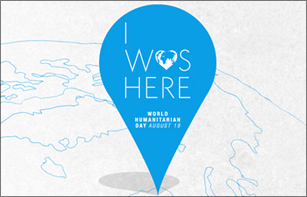World Humanitarian Day, observed on August 19, is an opportunity to celebrate the spirit of people helping people. The day is dedicated to recognizing those who face danger and adversity to help others, regardless of who they are and where they are.
Every day millions of people around the world are affected by natural disasters and conflicts. Displacement and poverty combined with conflicts or natural disasters can lead to humanitarian crises and have the potential to increase the vulnerability of affected populations to HIV infection and disrupt AIDS services.
According to the Together we will end AIDS report released by UNAIDS ahead of the XIX International AIDS Conference in Washington, there were an estimated 34.2 million people living with HIV in 2011. More lives are being saved thanks to access to antiretroviral therapy: more than eight million people were receiving treatment in 2011, with coverage reaching 54% of all people eligible. Fewer people acquired HIV infection in sub-Saharan Africa in 2011 than in any year since 1997.
Despite significant progress, there is still much to be done. The global AIDS response needs the sustained contribution of humanitarian aid workers who bring assistance and relief to millions of people affected by HIV. “I salute all humanitarian workers, especially people working on the front lines of the AIDS response,” said UNAIDS Executive Director Michel Sidibé.
Nothing is too small
Everyone can play a role in humanitarian response. A campaign "I Was Here" launched by the United Nations and humanitarian aid organizations ahead of the World Humanitarian Day calls on all people to make a mark by doing something good, somewhere, for someone else. “Do one thing for another human being. Nothing is too small,” says pop singer Beyoncé in the video prepared for the campaign.
The campaign offers a list of simple things that people can do to make a difference. For example, helping someone with their shopping, cooking a meal for a new mother, comforting someone in hospital or tutoring a disadvantaged young person are a few actions that people can take.
To support the AIDS response you can also make a donation and spread the word by following UNAIDS on Twitter and Facebook.
Commemorating humanitarians who lost their lives in service
By helping others, many people sacrifice their most precious possession: their life. World Humanitarian Day pays tribute to those who have perished in humanitarian service globally.
UNAIDS was one of five United Nations organizations to lose staff members in the bomb blast at the UN building in Abuja in August 2011. Elisha Enaburkhan was killed when the explosion hit the UN building.
Speaking of his colleague and friend, the UNAIDS Country Coordinator in Nigeria, Kwame Ampomah, said: “Elisha was a highly committed staff member. Even though he lived about 45 kilometers from town, he was always the first person to get to the office and often the last to leave. Elisha was an attentive, courteous and very kind man. He was always smiling and laughing—we will miss Elisha’s smile.”
August 19 was designated as World Humanitarian Day by Resolution 63/139—‘Strengthening of the coordination of emergency humanitarian assistance of the United Nations’—adopted by the General Assembly after the terrorist bombing at the United Nations headquarters in Baghdad.
World Humanitarian Day is observed annually to contribute to increasing public awareness about humanitarian assistance activities worldwide and the importance of international cooperation in this regard. It honours all humanitarian personnel who have worked in the promotion of the humanitarian cause, as well as those who have lost their lives in the cause of duty.
UNAIDS condemns any deliberate violent attacks against humanitarian personnel and facilities and the negative implications of such attacks on the provision of humanitarian assistance to populations in need.




